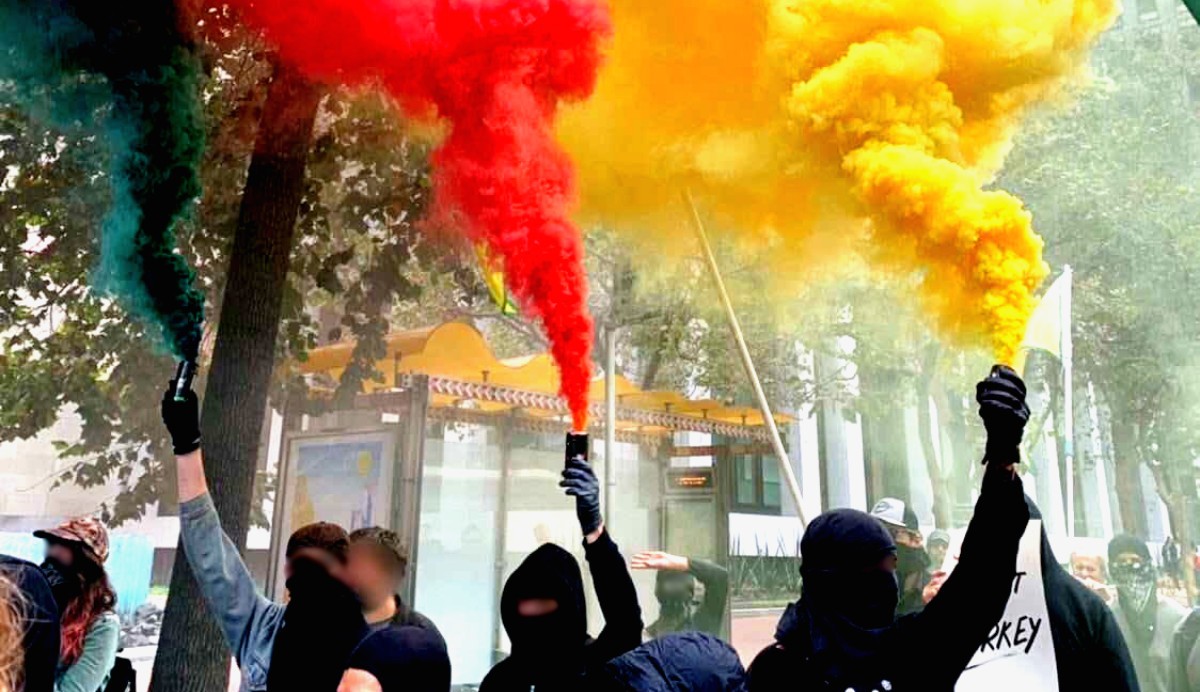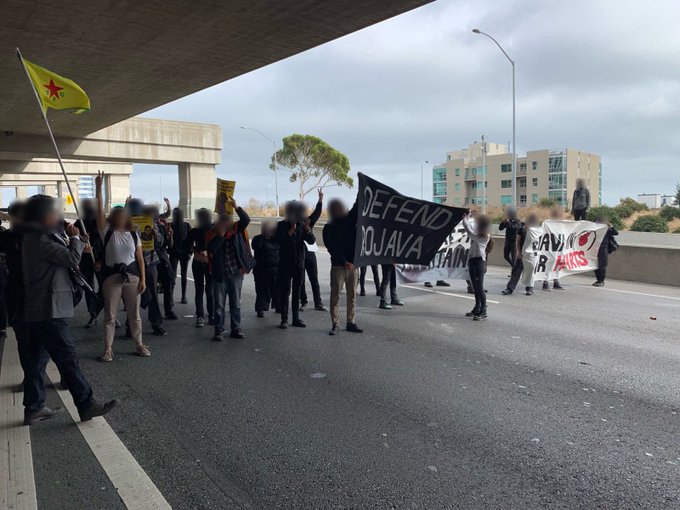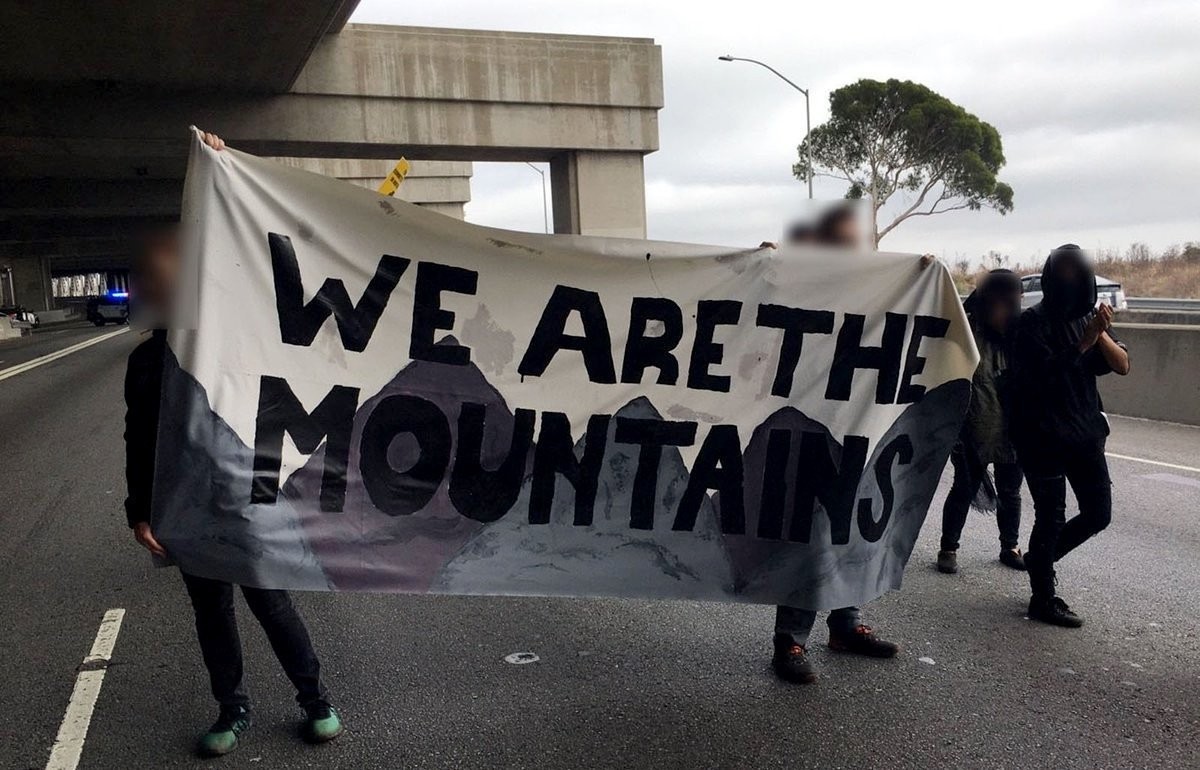Filed under: Analysis, Anarchist Movement, Featured, Solidarity, Southwest, War

The following are reportbacks from three actions which took place over the course of the last two weeks in the San Francisco Bay Area in solidarity with Rojava.
We encourage those across the U.S. to both replicate and go beyond what we’ve been able to accomplish in our own locale. Learn from our mistakes, build on our successes, fight hard.
October 12th: San Francisco International Airport
In the afternoon of October 12th, about 100 people converged at San Francisco International Airport (SFO) to heed the call for international solidarity in the face of a Turkish invasion of Rojava. Those who convened at the airport included Kurds, militants, and other friends of the Rojava revolution. Some of us knew one another beforehand, and others only met in that moment.
Bay Bridge banner drop in solidarity with Rojava #defendrojava #riseup4rojava Call to action: https://t.co/gVaqRVF3Ls pic.twitter.com/9GWK5e8xlD
— AllOutBayArea (@alloutbay) October 12, 2019
Over the course of about 45 minutes, people began gathering in the arrivals area of SFO. Once we hit what felt like a critical mass, the crowd began moving toward a set of escalators leading to the ticketing area. Although it appeared we had caught the airport police by surprise, they acted quickly in trying to block our path off of the escalator. After a brief shoving match, and an unfulfilled threat to deploy pepper spray, the police backed off and allowed us to continue on to our intended target: Turkish Airlines.
Prior to this action, careful consideration was given to how we might best inflict consequences on the Turkish state. Being that the nearest Turkish consulate is in Los Angeles, it became clear that finding a local economic target linked to Turkey was our next best option. We soon landed on Turkish Airlines as it’s one of the most visible benefactors of the Turkish state, which owns a 40% stake in the carrier.
After the cops fell back, we continued to the ticketing counters of Turkish airlines, which were quickly and easily surrounded by our numbers. Chants of “hands off Rojava” and “Erdoğan terrorist” echoed beautifully through the terminal, while YPG and YPJ flags waved overhead. Using a bullhorn, speeches were made to highlight the atrocities being perpetrated by Turkey in Rojava. Confused Turkish Airlines staff attempted to ferry people around our blockade, but were successfully dissuaded by us physically blocking paths to any open counter.
#riseup4rojava ROJAVA IN OUR HEARTS pic.twitter.com/iyOeorkISm
— AllOutBayArea (@alloutbay) October 12, 2019
Realizing that we weren’t planning on leaving anytime soon, the airline’s staff soon began to direct people to another, nearby ticketing counter. It seemed that while we were holding the blockade, police were able to muster a small number of reinforcements, using them to erect metal barricades around what was to become the alternate ticketing area. As soon as the would be passengers were redirected, we followed their lead and attempted to disrupt the second ticketing area.
Unfortunately, having deployed reinforcements (including at least one especially nervous looking cop with a “less than lethal” shotgun) and barricades, the police managed to keep us from directly preventing the disbursement of tickets. Despite this, we surrounded the ticketing counter from both sides, making it clear that flying with Turkish Airlines was complicity with genocide and ethnic cleansing.
In the midst of this stalemate, quick thinking allowed for an evolution in our tactics. A comrade suggested skipping the ticketing counters altogether, and instead moving to directly block the nearby TSA checkpoint. Communication and trust allowed for word to spread through our ranks, without the police being alerted to the coming shift in our strategy.
#riseup4rojava SFO-IST #turkishairlines #TK80 blocked pic.twitter.com/eFmDF7taog
— AllOutBayArea (@alloutbay) October 12, 2019
We soon moved toward the TSA checkpoint, unknowing cops following closely behind us. Upon our arrival, TSA workers and police elected to shutter the entire checkpoint — closing off the entire area with large sliding glass panels.
Other than a number of angry passengers who attempted to force their way through our blockade, there was little confrontation. The police elected to simply redirect passengers to a TSA checkpoint in another section of the airport.
After more chanting, speeches, and an impromptu dilan (circle dance) in front of the checkpoint — victory was declared. Moving together, we then held a final march through the terminal and toward the exit. No arrests were made.
October 13th: Streets of San Francisco
Feeling energized from the prior day’s successful action, we prepared for the second gathering of the weekend.
Midday on the 13th, around 175 people gathered in San Francisco’s Union Square to continue denouncing the bloodthirsty actions of the Turkish state. Thanks to rigorous organizing and outreach work done in preparation, this demonstration included a great number of the bay area’s Kurdish community — from immigrants, to the diaspora.
While people began massing, speeches were called out over a mobile sound system to inform the wider public about the nature of Turkey’s aggression on Rojava, the valor and bravery of YPJ and YPG fighters, and the revolutionary project that they are defending.
Yesterday we blocked the airports, today we take the streets. #riseup4rojava pic.twitter.com/1yzxz5hrUC
— AllOutBayArea (@alloutbay) October 13, 2019
Large banners reading “Rojava in Our Hearts” and “Jin – Jiyan – Azadi” (Women – Life – Freedom) were unfurled, and soon the crowd had left the square, taking Post street and heading toward the waterfront. Prior planning allowed for the aforementioned mobile sound system to begin blasting out Kurdish resistance anthems, which resonated beautifully under our chants of “Turkey out of Rojava!” Despite the morbid circumstances under which the demonstration had been called, there was an atmosphere of celebration, of resilience, and of militant joy.
Arriving at a courtyard in front of the Ferry Building a final speech was made, declaring that we would be back every week, as long as Turkey’s brutality persisted. Goodbyes were said and people were encouraged to prepare for the next weekend’s action. Again, no arrests were made.
October 19th: Blocking the Bay Bridge
Following two successful actions, a general consensus soon formed within our network. An escalation of tactics was necessary.
A rally was called for the 19th, with the same gathering point of Union Square in San Francisco. The text of the call for this demonstration was the same as the previous, and did not suggest anything other than our plan to end, as before, at the waterfront.
However, secure parallel networks were utilized to disseminate our intention to take the eastbound I-80 on the Bay Bridge (which connects San Francisco to Oakland). Militants were instructed to come prepared and to take necessary precautions in concealing their identities.
Similar to the demonstration on the 13th, people began arriving at Union Square around 11 a.m. Music was played, speeches were given, and an original solidarity song was sung to lift the spirits of all who were in attendance. With around 80 people now present, the march once again took to Post Street, the mobile sound system in tow.
Upon reaching Market Street, our relatively small number had grown to around 110. Chants and music blared through the corridors of downtown San Francisco, as three march participants let off smoke devices in yellow, red, and green (colors associated with Kurdish Freedom Movement).
While police were following close behind, their activity suggested that they were completely unaware of our strategy. They wouldn’t be in the dark for long, though. Breaking from the previous route we had taken, the march turned down 1st Street, a terminal path that would take us to a freeway on ramp.
As the march started up an inclined section of the street, militants sprung into action, so as to block the path of the single police cruiser which followed closely behind us. Construction barricades on the sidewalk were dragged into the street, as the march continued upward. Finally realizing what we planned to do, SFPD was able to quickly muster at least one more SUV and a motorcycle cop to form a small skirmish line in front of the on ramp.
As we approached it, small smoke fireworks were tossed toward this line. The police though, didn’t get a chance to react, as the march fluidly turned the corner without bothering to engage with them. As we did so, a call came from within our ranks to begin to sprint — the police had left the bus on ramp, less than a block away from our first target, completely unguarded. As the march broke into a charge up the onramp, we soon found ourselves slowing down, and then completely stopping traffic in all eastbound lanes of I-80.
While the police scrambled to take positions about 200 feet further down the freeway, around 40 of us danced, waved YPJ/G flags, set off road flares, unleashed more colored smoke, and decorated the freeway dividers with revolutionary slogans. Shouts of “Biji Rojava!” “Biji YPJ!” reverberated through the bridge’s concrete structure. For about 15 minutes, all lanes of traffic were completely halted.
The relatively small size of our group allowed for a high degree of communication, fluidity of strategy, and agility on our feet. In this way, the group decided that after a blockade of 15-20 minutes, we had achieved our goal. Prolonging the situation, we believe, would have ceded the police the crucial amount of time necessary for them to organize their forces and kettle our small number. Instead, we denied them any chance at a static engagement. Satisfied with our success, the group then marched back the way we came. In this moment, many of those who had been on the freeway took the opportunity to shed layers of clothing and otherwise change their appearance.
Once regrouped, the march resumed its path toward the waterfront, stopping drivers and passersby to hand out leaflets, informing them both of Rojava’s revolutionary society and of the atrocities being perpetrated by the Turkish state. Eventually, we reached the same courtyard that the previous weekend’s march had ended in.
Concluding the action, names of şehîds (martyrs) were called out, to which those gathered responded with “Şehîd Namirin!” (“Martyrs Do Not Die!”). The group then dispersed. No arrests were made.
Concluding Thoughts
While some of these actions may have put us in peril of arrest, physical harm, or repression — this risk to our well being is nominal compared to the danger faced down by the defenders of Serê Kaniyê, Gire Spi, and the other fronts. Theirs is the courage that we drew upon to carry out these solidarity actions.
Global Day of Resistance for Rojava
– – – – – – – – – –November 2nd / 2 PM
14th & Broadway / Oakland@RISEUP4R0JAVA @crimethinc @IGD_News #riseup4rojava pic.twitter.com/slREb0xY7z— AllOutBayArea (@alloutbay) October 25, 2019
It is also important to note that the success of these actions can largely be attributed to the now years long work of forging connections, trust, and community between Bay Area radicals and local Kurdish residents. While not everyone was willing or able to assume the same amount of risk, we believe that prior discussion, willingness to rigorously critique/be critiqued, and care allowed for us to organize in a way that made space for diverse range of participants at each of these actions.
A Call to Participate on November 2nd
The Internationalist Commune of Rojava has declared November 2nd “World Resistance Day.”
We endorse and repeat their call for international participation in acts of defiance and resistance to authoritarianism and solidarity with the revolution in Rojava. Join or plan an action near you.
In the Bay Area we will meet on November 2nd at 2 p.m. in Oakland’s Oscar Grant Plaza (14th and Broadway). Facebook event is here. If you live in the Bay Area, please share this event widely and invite your friends.
We’ll see you there.
Biji Berxwedan!
Biji Rojava!







